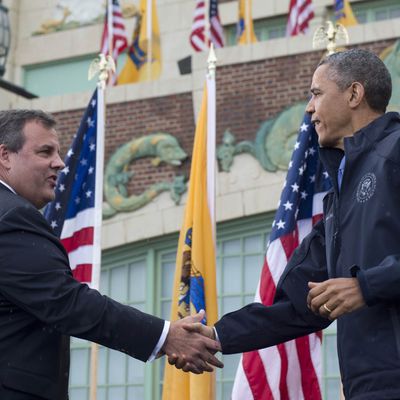
Being one of those readers who likes to savor a great print story when I can, I finally got around to reading Ben Wallace-Wells’s great cover story on Chris Christie. The point of it is that Christie’s belligerence is genuine, not a tactic he manipulates, and also represents New Jersey’s idea of itself. But this leaves me more confused than ever as to how Christie could win the Republican nomination, or, especially, why Republicans would want to nominate him in the first place.
Christie is certainly popular. His popularity stems from his very high-profile bipartisanship — people know him from his strolls on the beach with President Obama, and they yearn for that kind of cross-party accord. But the success of that method is inherently limited.
The unusual thing about Christie is that he is unlikable — or, at least, unlikeable by the standards of everywhere in America save New Jersey and perhaps some of its immediate environs. One problem here is that having a persona that’s tolerable only to residents of the Garden State, and unbearably obnoxious to the rest of America, is a poor formula for winning a presidential primary. Republicans may like the way Christie bullies and berates Democrats, but they don’t want to see him bullying and berating Marco Rubio and Paul Ryan.
Ryan, moreover, highlights the second, deeper problem with a Christie nomination. Voters in a general election judge candidates by a combination of personal and ideological characteristics. George W. Bush deflected on his unpopular, regressive tax cut by acting like a gentle, normal guy. The nicer and gentler you seem, the more room you have for an election platform that’s neither nice nor gentle. That’s Paul Ryan’s formula — match a radical program with a soft-spoken persona. Eventually, the contradiction between Ryan’s persona and his agenda became too great to sustain, but Ryan is trying to patch up the problem using the same method. He’s talking about poverty all the time. What he’s not doing is changing his proposals to eviscerate funding for programs for the poor.
Ryan’s method makes sense. As a party, you want to spend your “frighten swing voters” budget on real policies. Spending it on personality is a total waste. Ryan himself may go so far on policy that no amount of aw-shucks Midwestern wholesome I’ve-never-heard-of-foreign-beer-I-drink-Miller-Lite charm can make up for it. But he has the general idea. Christie is the anti–Paul Ryan.
Josh Barro enthuses that Christie is cleverly using his obnoxious persona to deflect attention from his relatively mainstream platform. He notes that Christie actually supports the Medicaid expansion under Obamacare, a stance conservatives deem unforgivable. “[H]e’s found a way to sell himself to the right without actually moving to the right,” argues Barro. “If someone actually picks up his budget books, Christie will be outed as a moderate.”
Well, unless Christie runs unopposed for the nomination (as Mitt Romney sort of did), someone will pick up his budget book. Verbal abuse won’t get him out of that trap. It’s not an insurmountable obstacle, but it highlights the oddness of the fit. Why nominate a candidate who looks and sounds like a right-wing ogre but actually isn’t? The opposite sounds like a far better plan.






























